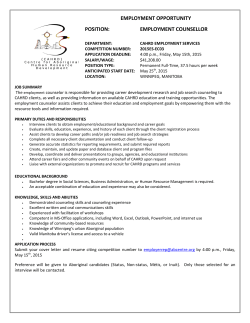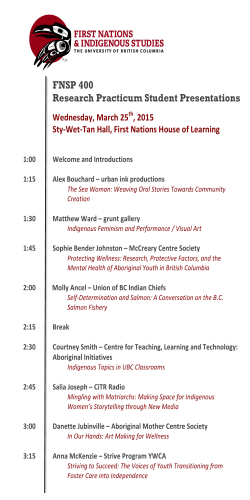
Media Release June 11 2015-Aboriginal Affairs Budget Cuts
Head Office Long Plain First Nation, Box 998, Portage La Prairie, Manitoba Winnipeg Sub-Office 105 – 1555 St. James Street, Winnipeg, Manitoba Phone: (204) 946-1869 Fax: (204) 946-1871 R1N 0P0 R3H 1B5 www.scoinc.mb.ca Toll Free: 1-866-876-9701 FOR IMMEDIATE RELEASE SCO APPALLED AT LACK OF FUNDING FOR FIRST NATIONS AND 1 BILLION DOLLAR SURPLUS FOR ABORIGINAL AFFAIRS IN 2015 Winnipeg, June 11, 2015—The Harper government is responsible for huge funding cuts to First Nations; even more disturbing is that Aboriginal Affairs has deliberately withheld hundreds of millions of dollars of desperately needed subsidy year after year. A report by the Privy Council Office determined that Aboriginal Affairs has withheld over $1 billion of spending allocated for social services over the last five years. Aboriginal Affairs is among key departments in government found to be ‘serial’ offenders, regularly underspending what is budgeted by large amounts annually. Southern Chiefs’ Organization (SCO) represents 33 First Nations in Manitoba. SCO First Nations have anywhere from 60 to 95% unemployment rate. In addition to high rates of poverty, our First Nation communities often suffer from lack of funding in social services. Aside from the shortage of adequate, safe housing, running water, and affordable food on many First Nations reserves, the social issues that accompany harsh living conditions exacerbate the challenges of individuals and their communities. The scarcity of funding for quality education on reserves and the sparse allocation of funds to adequately address social issues like family violence and high rates of suicide, make this deliberate action by Aboriginal Affairs all the more disconcerting. The $218 million that Aboriginal Affairs underspends each year could help address the needs of the appalling amount of children in care with CFS and their families, or be used for an inquiry into the pervasive issue of Missing and Murdered Indigenous Women and Girls. Grand Chief Terrance Nelson stated “The Federal government policies deliberately create an economic wasteland for First Nations, which Prime Minister Harper should understand is a definition of Genocide as defined by the United Nations Convention on the Prevention and Punishment of Genocide, Article II, (C), Deliberately inflicting on the group conditions of life calculated to bring about its physical destruction in whole or in part.” “Representing Anishinaabe, Cree and Dakota First Nations in Southern Manitoba” Prime Minister Harper balks at the use of the word Genocide in describing past Canadian government policies like those which mandated the Indian Residential Schools. This evidence of underfunding is just another example that Canada’s action against the First Peoples of these lands is not rooted in the past; rather, it continues to be Canadian policy today. Aboriginal Affairs’ clear intent to withhold monies intended to improve the living conditions of First Peoples and accommodate their access to vital social services is appalling and abhorrent. “Now is the time for the United States government to rebuke the Harper government and insist that Canada change its Genocidal policies against the First Peoples. The First Peoples should be compensated for their natural resource wealth. Nations worldwide need to question why at $1 million dollars a minute in trade between Canada and the United States, the First Nations of Canada are left to beg for funding from the federal government to support social programs.” Grand Chief Nelson As the recent findings of the Truth and Reconciliation Commission suggest, Canada’s Indigenous peoples have suffered from generations of trauma and historical abuse—the clear neglect of underfunding to social services indicates a racial and ethnic discrimination that continues to marginalize and exclude Canada’s First Peoples from fully participating in society. For Further Information Contact SCO Grand Chief Terrance Nelson 204-233-7730 or [email protected] -30- “Representing Anishinaabe, Cree and Dakota First Nations in Southern Manitoba”
© Copyright 2026











